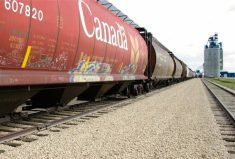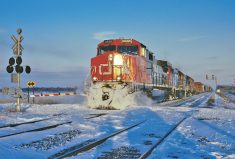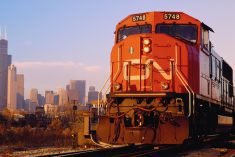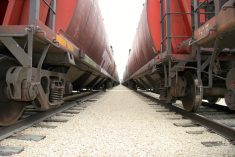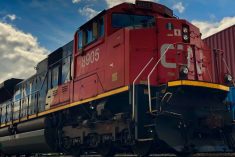Washington | Reuters — The Surface Transportation Board of the United States said on Wednesday it had approved Canadian Pacific Railway’s US$31 billion acquisition of railroad company Kansas City Southern, with a series of environmental and competition conditions.
The board, which oversees U.S. freight railroads, is imposing some requirements on the deal, which was agreed in 2021, including an “unprecedented seven-year oversight period along with extensive data-reporting requirements.”
The acquisition, which combines the sixth- and seventh-largest railroads operating in the U.S. by revenue, will create the first railroad providing a single-line service spanning Canada, the U.S. and Mexico. It is projected to add 800 new unionized operational jobs in the U.S. and will shorten the average length of trains by just under 20 per cent.
Read Also

U.S. grains: Soybeans continue gains on Trump’s China comments
Chicago | Reuters – Chicago Board of Trade soybeans continued a three-day rally on Friday, fuelled by President Donald Trump’s…
CP CEO Keith Creel said in a statement that the board’s decision “clearly recognizes the many benefits of this historic combination. As the STB found, it will stimulate new competition, create jobs, lead to new investment in our rail network, and drive economic growth.”
In the same statement, Kansas City Southern said the decision “is the catalyst for realizing the benefits of a North American railroad for all of our stakeholders.”
The decision is effective on April 14 and calls for reconsideration petitions to be filed by April 4. Calgary-based CP’s TSX-traded shares rose about six per cent to C$105.74. Kansas City Southern shares were transferred to a trust and the railroad has operated independently ahead of the board decision.
The STB said it expects the new single-line service will foster the growth of rail traffic and reduce emissions by shifting approximately 64,000 truckloads annually from North American roads to rail.
It also concluded that the deal will not increase safety risks in any meaningful way, an issue that has been raised in the wake of a recent Norfolk Southern derailment in Ohio. It noted CP has had the best safety record of any large railroad over the last 15 years.
The STB also approved measures to address “potential environmental impacts of the transaction, such as increased noise,” and it will require the railroad to justify “rate increases over a certain level” on some interline movements.
The deal will also foster new U.S. passenger railroad Amtrak service opportunities, the board said.
The new direct service will facilitate the flow of grain from the U.S. Midwest to the Gulf Coast and Mexico, the movement of intermodal goods between Dallas and Chicago and trade in automotive parts, vehicles, and other goods between the U.S. and Mexico, the STB said.
The board can issue orders to enforce required environmental mitigation measures and address capacity and maintain fluidity in Houston, Chicago and other congested areas, “including preventing potential merger-caused delays and service disruptions of commuter service in the Chicago area.”
This transaction is “end-to-end,” which means there are little to no track redundancies or overlapping routes, and the board said the move will reduce travel time for traffic moving over the single-line service.
At least two U.S. grain grower groups on Wednesday panned the STB’s decision, saying the combination would decrease competition for the rail-reliant grain sector.
“U.S. rail industry consolidation has led to poorer, not improved, service for agricultural shippers,” Vince Peterson, president of U.S. Wheat Associates, said in a release.
“In addition, we see extreme disparity in rates for wheat shippers. Rail rates over the last decade have increased exponentially and rates for wheat are higher than rates for other commodities even with similar handling characteristics.”
The U.S. National Association of Wheat Growers’ (NAWG) CEO, Chandler Goude, said in the same release that the group “maintains our concerns that the merger of CP and KCS will impede competition in the rail market and increase rail rates.”
— David Shepardson reports on the U.S. transport sector for Reuters from Washington. Includes files from Glacier FarmMedia Network staff.




